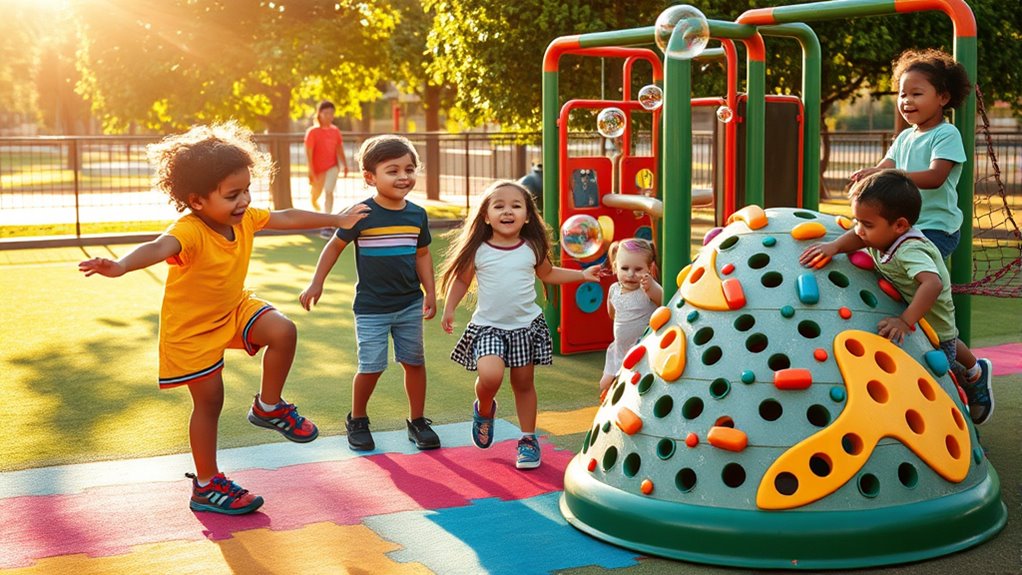Play is essential for your child’s growth because it actively involves them in exploration, social interactions, and hands-on learning. Through play, they develop emotional intelligence, learn social norms, build confidence, and improve their social skills. It also offers a safe space to practice real-life situations and manage feelings. If you want to discover more about how play shapes your child’s future, keep exploring these valuable insights.
Key Takeaways
- Play actively engages children in exploration, supporting hands-on learning and social interaction essential for development.
- It fosters emotional intelligence by helping children recognize, manage, and express feelings in a safe environment.
- Play allows children to experiment with social roles, understanding norms, empathy, and perspective-taking.
- Engaging in play builds confidence, promotes social competence, and encourages positive peer relationships.
- Diverse play experiences support holistic growth, enhancing emotional, social, and cognitive skills simultaneously.

Play is a crucial part of child development because it actively engages children in learning, exploration, and social interaction. When you let children play freely, you’re giving them opportunities to develop essential social skills that will serve them throughout life. Through play, kids learn how to share, take turns, and negotiate with others. These interactions help them understand social cues, recognize different perspectives, and build relationships. As children steer through these social situations, they also enhance their emotional intelligence—an ability to identify, understand, and manage their feelings and those of others.
During play, children often face situations that require patience or conflict resolution. When you observe or facilitate play, you’re helping them practice managing emotions like frustration or excitement in a safe environment. This emotional regulation is a core part of emotional intelligence, enabling children to respond thoughtfully rather than impulsively. For example, if a child feels upset because they didn’t get a turn, they learn to express their feelings verbally or find alternative solutions. These experiences foster self-awareness and empathy, which are vital components of emotional intelligence.
Play helps children practice managing emotions like frustration and excitement, building emotional intelligence through safe, real-life experiences.
Play also encourages children to experiment with different social roles and scenarios, giving them a deeper understanding of social norms and expectations. Whether they’re pretending to be a doctor, a parent, or a superhero, they’re practicing empathy and perspective-taking. This imaginative play helps them understand how others might feel and what motivates their actions. As a result, they become more attuned to social cues and better at navigating complex social environments later in life.
In addition, play offers a space where children can build confidence in their social abilities. When they successfully interact with peers, they gain a sense of competence and reassurance. These positive experiences reinforce their willingness to engage with others, fostering a sense of belonging. As you support and encourage their play, you’re helping them develop a healthy foundation for emotional resilience and social competence. Recognizing the importance of diverse play activities, especially those involving color accuracy, can further enrich their developmental experiences.
Frequently Asked Questions
How Does Play Influence Emotional Regulation in Children?
Think of play as a bridge to emotional resilience; it helps children manage stress and navigate feelings. When you encourage your child to play, you’re giving them tools to express emotions and build confidence. Play allows children to practice coping strategies in a safe space, strengthening their stress management skills. Ultimately, active play boosts emotional regulation, helping your child face challenges with a balanced mind and a resilient heart.
What Types of Play Best Support Language Development?
You can support language development by encouraging interactive storytelling and role-playing games. These activities stimulate your child’s vocabulary, comprehension, and conversational skills. When you engage in storytelling, you help them practice new words and sentence structures. Role playing allows them to use language creatively in different scenarios, boosting their confidence and communication abilities. These play types make learning fun and natural, fostering their overall language growth effectively.
How Can Parents Encourage Unstructured Play at Home?
To encourage unstructured play at home, give your child space and time for independent exploration. Provide open-ended materials like art supplies, blocks, or dress-up clothes to inspire creative improvisation. Avoid overly scheduled activities, and instead, let your child lead their play. Join in occasionally to support their ideas, but mainly, create an environment where they feel free to explore and imagine freely, fostering their independence and creativity.
Are There Age-Specific Play Activities That Promote Cognitive Skills?
You can promote cognitive skills through age-specific play activities like sensory play for younger children, which boosts their exploration and understanding of textures and sounds. For older kids, encourage imaginative activities such as role-playing or storytelling, which enhance creativity and problem-solving. Tailoring these activities to your child’s developmental stage helps sharpen their thinking, language, and reasoning skills while keeping play engaging and fun.
What Are the Long-Term Benefits of Play for Adult Problem-Solving?
Play massively boosts your long-term problem-solving skills, turning your mind into a powerhouse of creative thinking and social skills. When you engage in playful activities, you stretch your brain’s capacity to think outside the box and navigate complex social dynamics. This mental workout makes you sharper, more adaptable, and better at tackling challenges in adulthood. Fundamentally, play isn’t just fun; it’s the secret weapon for lifelong problem-solving mastery.
Conclusion
You might not realize it, but that simple game you play with your child today could shape their future in ways you never expected. Play isn’t just fun—it fosters creativity, boosts confidence, and builds essential skills. Sometimes, the most unexpected moments during play lead to the greatest breakthroughs. So, keep engaging, keep exploring together, because those spontaneous, joyful interactions are truly the building blocks of your child’s development. And who knows? The next great idea might come during your next play session.











